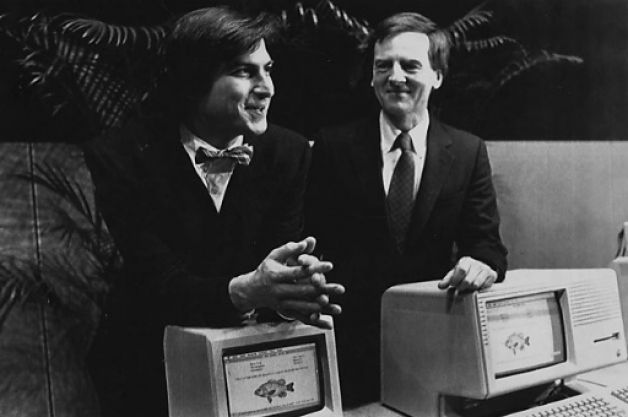MIT reaserchers have created a low-cost virtual-reality system. From Cult of Mac: “Not only can you reach into the virtual world and manipulate the objects you create there, but there’s a way to connect with others, locally or remotely, to collaborate within a shared 3D virtual space. Looks like all that virtual reality stuff from the late 1990s is coming around again, only with the iPad, an off-the-shelf computing system with plenty of power for this application.”
You are currently browsing the yearly archive for 2012.
Just to simplify this for members of the Senate investigating whether Secret Service agents have been involved with prostitutes in the past: Yes, many, many times Secret Service agents have paid other people to perform sex acts with them. These agents possessed vital information and could have had a briefcase stolen or been blackmailed. You know who else has vital info and has had sex with prostitutes countless times over the years? Members of the Senate and Congress. Because many of them are on committees and are privy to sensitive info about the President, they also could be blackmailed. Additionally, many Presidents in the past (though not the current one by all accounts) have had all sorts of sexual affairs which could have put their lives and our state secrets in danger. Now you can save the money you’ve been spending on trying to learn that human beings have a difficult time controlling sexual impulses no matter what’s at stake.
I’m not condoning any of it, but representatives in D.C. pretending they’re shocked by important officials hooking up with prostitutes aren’t being very honest.•
Old smelly vinyl LP albums wanted (Stamford)
Do you have those old albums from the 1950s – 1970s that smell like mold and you no longer want? I’ll definitely take ’em whether there’re records in them or not. I’m starting a collection and don’t mind the smelly ones. I love the pictures on the albums. Can offer money for them too if you want, although probably not very much.
The future is scary not just for the unbalanced but for the observant as well. But questioning the road ahead and trying to blow it up so that no one can proceed are two very different things. It’s a thorny situation, then, for those who abhor the Unabomber’s violent acts but see sensible assertions in Ted Kaczynski’s anti-tech manifesto. Michigan philosophy professor David F. Skrbina finds himself in that tight spot, having become a confidante of sorts for the imprisoned domestic terrorist. From “The Unabomber’s Pen Pal,” Jeffrey R. Young’s revealing Chronicle of Higher Education piece about the unusual bond:
“But when David F. Skrbina, a lecturer in philosophy at the University of Michigan here, read the manifesto in The Washington Post on the day it was published, he saw value in the message. He was particularly impressed by its clarity of argument and its references to major scholars on the philosophy of technology. He saw a thinker who wrongly turned to violence but had an argument worthy of further consideration. That argument certainly wasn’t perfect in Skrbina’s view, and he had some questions. Why not just reform the current system rather than knock it down? What was Kaczynski’s vision of how people should live?
In November 2003, Skrbina mailed a letter to Kaczynski, then as now in a supermax prison in Colorado, asking those and other questions designed ‘to challenge him on his views, to press him.’
So began a correspondence that has spanned more than 150 letters and has led Skrbina to help compile a book of Kaczynski’s writings, called Technological Slavery, released in 2010. The book is a kind of complete works of this violent tech skeptic, including the original manifesto, letters to Skrbina answering the professor’s questions, and other essays written from the Unabomber’s prison cell.
Today, Skrbina is something like a friend to Kaczynski. And he’s more than that. The philosophy lecturer from Dearborn serves as the Unabomber’s intellectual sparring partner, a distributor of his writings to a private e-mail list of contacts, and at times even an advocate for his anti-tech message.” (Thanks Browser.)
From the September 29, 1900 Brooklyn Daily Eagle:
“Flushing, L.I.–Ferdinand Dohn started to sneeze yesterday morning soon after he arose, about 6 o’clock, and he continued to sneeze until 8 o’clock last night, when he burst a blood vessel in the neck and was removed to the Flushing hospital.
The physicians there say that it is one of the most remarkable cases they have had to deal with.”
Tags: Ferdinand Dohn
I told you recently about the publication of The Lowbrow Reader Reader, a new book form of Jay Ruttenberg’s great zine about comedy. (You can buy it from Amazon or the publisher.) Now comes news that there will be a publication party and music and comedy showcase at 7pm on May 29 at Housing Works Bookstore in Manhattan. And you are invited! It’s a free event, though the organizers ask that you contribute a couple of bucks or buy some refreshments while you’re there to help AIDS charities. Featured performers at the event:
- Wyatt Cenac: Hilarious Senior Correspondent of The Daily Show with Jon Stewart, one of my all-time favorite TV shows and a program that I would never criticize.
- Professor Irwin Corey: The 97-year-old comedian used to hang out with the Rolling Stones but now is stuck with Jay Ruttenberg.
- Supercute!: A great band made up of teenage girls. Sadly, they are amazingly talented and have their whole lives ahead of them. On the bright side: We’ve already ruined the planet and every time they try to text, the sun melts their little thumbs. Too bad, sweethearts.
- Adam Green: The more doelike half of the Moldy Peaches, and one of the best songwriters on Earth.
Find out all the information you’ll need here.
••••••••••
The Official Announcement:
Dear Friends,
I am thrilled to announce the imminent arrival of our Pulitzer-worthy book, The Lowbrow Reader Reader, which will be published by Drag City in just a couple of weeks. To celebrate, we’re having an extra special Lowbrow Reader Variety Hour concert on Tuesday, May 29, at the lovely Housing Works Bookstore in Soho (126 Crosby Street, just below Houston). It will start promptly at 7pm and end around 8:30pm. Admission is free, but I would encourage everybody to give some money to Housing Works, whether by throwing some dollars in the pot or simply buying food and drinks while at the store. It’s a really wonderful charity that fights AIDS and homelessness.
Now check out this all-star line-up of performers! The night will include short sets from:
—Adam Green (one of the greatest songwriters in New York City and hence the known universe; a veteran of the Moldy Peaches and several outstanding solo albums including my favorite, 2010’s Minor Love)
—Wyatt Cenac (ludicrously, unjustly sharp stand-up comedian and senior correspondent for The Daily Show with Jon Stewart)
—Supercute! (your new favorite band, Supercute! stars three teenage girls: Julia Cumming, Olivia Ferrer, and Rachel Trachtenburg, of the Trachtenburg Family Slideshow Players)
–plus a special appearance by….Professor Irwin Corey (comedy LEGEND)
More information about the concert can be found here: http://www.housingworks.
More information about the book (including ordering information and whatnot) can be found here: http://www.dragcity.com/
It goes without saying, but I would love to see all of you at the show: Tuesday, May 29, 7pm, Housing Works Bookstore. Of course, please let me know if you have any questions!
Thank you!
Jay
Tags: Adam Green, Irwin Corey, Jay Ruttenberg, Supercute!, Wyatt Cenac
During May, no major news organization distinguished itself in the area of side-boob journalism like the Huffington Post. A few examples:
Bonus nip-slip coverage:
Peter Griffin, journalist:
Tags: Arianna Huffington
A segment about Marcel Duchamp and his unfinished meta-machine The Large Glass from Robert Hughes’ excellent 1982 program, The Shock of the New.
Tags: Marcel Duchamp, Robert Hughes
There are corresponding pieces in Wired and Businessweek about authoritarian rulers in the Internet Age, trying to defend their their regimes from wired dissidents by using new media tools and aggressive PR tactics.
- From Matthieu Aikins’ excellent Wired article, “Jamming Tripoli: Inside Moammar Gadhafi’s Secret Surveillance Network“:
“But like [Ghaida al-] Tawati, these activists would suffer greatly at the hands of Gadhafi’s spy service, whose own capabilities had been heightened by 21st-century technology. By now, it’s well known that the Arab Spring showed the promise of the Internet as a crucible for democratic activism. But, in the shadows, a second narrative unfolded, one that demonstrated the Internet’s equal potential for government surveillance and repression on a scale unimaginable with the old analog techniques of phone taps and informants. Today, with Gadhafi dead and a provisional government of former rebels in charge, we can begin to uncover the secret, high tech spying machine that helped the dictator and his regime cling to power.
The regime had been following Tawati online for years, and the harassment of her was mostly orchestrated by a group that came to be called the Electronic Army. According to former members, this loose organization was founded several years ago when Mutassim Gadhafi, one of the dictator’s playboy sons, had been enraged after videos of him attending a nude beach party on New Year’s Eve were posted online. Mutassim, who chaired Libya’s National Security Council, created a group of Internet users, some paid, some volunteer, to try to take down those videos and other anti-Gadhafi material posted online. They bombarded YouTube with flags for copyright infringement and inappropriate content; they waged a constant back-and-forth battle with critics of the regime, whom they would barrage with emails and offensive comments.
After all the cruelties she had endured as a child, Tawati could deal with the insults directed at her. But it stunned her when, in August 2010, some of her private email exchanges with other dissidents somehow got leaked to Hala Misrati, a notorious TV propagandist and one of the Electronic Army’s apparent leaders. How had her accounts been compromised, she wondered?
The answer, though she would not know it until after the regime fell, lay in a secret deal Gadhafi had made with a company called Amesys—a subsidiary of the French defense firm Bull SA—for technology that would allow his spy services to access all the data flowing through Libya’s Internet system. In a proposal to the regime dated November 11, 2006, Amesys (then called i2e Technologies) laid out the specifications for its comprehensive Homeland Security Program. It included encrypted communications systems, bugged cell phones (with sample phones included), and, at the plan’s heart, a proprietary system called Eagle for monitoring the country’s Internet traffic.”
- From Joshua Kurlantzick’s Businessweek review of William J. Dobson’s new book, The Dictator’s Learning Curve: Inside the Global Battle for Democracy:
“These New Age autocrats, he says, can no longer rule by brute force. Instead, they use ‘more subtle forms of coercion’ while investing heavily in maintaining the appearance of rights, law, and elections, and keeping their borders open so that opponents can always leave. ‘Modern dictators,’ he contends, ‘understand it is better to appear to win a contested election than to openly steal it.’ He points to Chavez, who altered legislation to boost his chances of electoral victory, then, after winning, used his poll victory to eviscerate opponents—never accepting the idea, crucial to democracy, of legitimate differences between parties. Then there’s Putin, who maintains the façade of a constitution while working in what Dobson calls the ‘seams of the political system’ to centralize power, using proxies to take over leading companies and key media outlets. Putin has created government-dominated NGOs that mimic free speech but make it harder for activists to get their voices heard.
Today’s smartest dictators, such as the Chinese Communist Party, adopt many of the technocratic methods of the most successful modern businesses, justifying their rule with their economic success. The CCP operates by consensus at the highest levels, while tailoring the government, at local levels, to enhance the delivery of services without actually opening up the political system. The party also normally keeps its internal debates internal, presenting a uniform face to citizens.”
Tags: Joshua Kurlantzick, Matthieu Aikins, Muammar el-Qaddafi, William J. Dobson
Dick Cavett and Eddie Murphy discussing the use of the N-word in Huckleberry Finn, both freely saying the whole word repeatedly. I would assume this is the Cavett show iteration that aired on USA cable in 1985-86, but it looks as if it could have been shot in his garage in front of hobos. Lousy audio but worth it.
Tags: Dick Cavett, Eddie Murphy
New York’s Port Authority has announced that Airus Media hologram assistants will be installed at NYC airports to answer traveler questions. From Sarah Kessler at Mashable:
“One of the new customer service representatives at New York City’s three major airports this summer will stand out from the rest. She is friendly, helpful, and made out of plexiglass.
In other words, she’s North America’s first avatar airport customer service representative.
The Port Authority of New York and New Jersey unveiled the virtual assistant Tuesday morning. It works by projecting video from a human spokesperson onto a life-size cutout of a woman.”
Tags: Sarah Kessler

"Anderson’s responses were still a good distillation of TED’s ideology." (Image by Steve Jurvetson.)
I enjoy a lot of TED lectures and have posted some here, but I highly recommend “Don’t Mention Income Inequality Please, We’re Entrepreneurs,” a smart Salon article by Alex Pareene about the wealthy organization’s unspoken politics. The opening:
“There was a bit of a scandal last week when it was reported that a TED Talk on income equality had been censored. That turned out to be not quite the entire story. Nick Hanauer, a venture capitalist with a book out on income inequality, was invited to speak at a TED function. He spoke for a few minutes, making the argument that rich people like himself are not in fact job creators and that they should be taxed at a higher rate.
The talk seemed reasonably well-received by the audience, but TED ‘curator’ Chris Anderson told Hanauer that it would not be featured on TED’s site, in part because the audience response was mixed but also because it was too political and this was an ‘election year.’
Hanauer had his PR people go to the press immediately and accused TED of censorship, which is obnoxious — TED didn’t have to host his talk, obviously, and his talk was not hugely revelatory for anyone familiar with recent writings on income inequity from a variety of experts — but Anderson’s responses were still a good distillation of TED’s ideology.”
Tags: Alex Pareene, Nick Hanauer

"The patient is first laid down and the surgeon with a small razor cuts a triangular piece of skin from the forehead."
I knew that people were getting cosmetic surgery in the 1800s, but I didn’t know that actual noses were being created from human flesh. From the July 22, 1888 edition of the Brooklyn Daily Eagle, an article originally published in the London Standard:
“They are discussing artificial noses in Vienna, it seems, and the savants take credit for a grand advance of science in this age over the immemorial methods of the East. Probably enough, their congratulations are justified; but we should have more faith if they showed better acquaintance with the methods they condemn. It is not the fact that Oriental surgeons take a strip of flesh from some other person’s body and make of it a new nose for their patient. That is a European practice of late date, and if Viennese authorities disapprove it they must quarrel with their confreres. The Eastern practice is ‘immemorial’ indeed, and for so many ages it has been used with success that neither operators nor sufferers are likely to change it. That practice is absolutely the same which the professors assert to be a modern triumph. Mr. Baden Powell, in his great work upon the arts and manufactures of the Punjab, describes it: ‘The patient is first laid down and the surgeon with a small razor cuts a triangular piece of skin from the forehead, which he dexterously twists just at the juncture of the nose with the brow so as to bring the right side of the skin to the front, etc., exactly as our scientific people do. It is a process hereditary in certain families of the Kangra district, where it was likely this art was exercised before Vienna was heard of.”
Tags: Robert Baden-Powell
The opening of “Fran Lebowitz on Race,” a 1997 Vanity Fair piece that was a revelation for a country that couldn’t yet visualize its first African-American President nor the Birther backlash that landmark would evoke:
“Do you think the proper way to talk about race now is to talk about multiculturalism?
I came from a town where there were two races, black and white. There were a few Chinese people, and this may sound shocking, but I had no idea they were a different race. I thought they were a different nationality, like Italian or French. Now you have people coming here from Cambodia, from Egypt, from Colombia, from places you never thought would be sending us their huddled masses. I mean, surely 20 years ago no one could have imagined a more unlikely pair of words than ‘Korean deli.’ And all these people think of themselves as being members of different races. Ethnic groups have taken on the same weight as racial groups, with the same demands, the same notion of themselves.
To me, this plays into the hands of the people in power — the white people. If you want to ensure generation after generation of Mexican gardeners in California, you insist on bilingual education in the grammar schools. You can pretend that you would just as soon have your cardiologist speak to you in Spanish, but if you don’t speak Spanish, you would just as soon not.
If you’re black, don’t you say to yourself, ‘We’ve been here for a zillion years, and here are all these people coming along, acquiring power by saying they’re powerless acquiring power by equating their lot with ours’? Blacks are the standard of oppression. People are always taking appalling historical events that one would hope are unparalleled and making absurd and immoral equations: the police raid the Stonewall Inn and instantly and forever it’s ‘Bull’ Connor turning the fire hoses on the marchers in Birmingham; antiabortion maniacs throw fetuses at abortion-performing doctors and an absolutely unembarrassed analogy is made to a lynch mob. These things are categorically unrelated, as are most things. Things are very rarely exactly like other things. If they were, people would be less baffled in general, and perhaps less given to such statements as ‘This is like the Holocaust.’ Nothing is like the Holocaust. Not that there haven’t been other tragedies, other genocides. But simply that they were peculiarly, specifically, intrinsically like themselves. Genocides are like snowflakes, each one unique, no two alike. You can’t go around making these horrendously invalid comparisons. It is disgraceful and annoying. If you were in Auschwitz, you undoubtedly feel that on top of having been in Auschwitz you shouldn’t also have to have your experience used to justify, say, gay marriage.
What is actually served by multiculturalism and all things attendant to it is the power of white people, and this, despite any and all such academic quibbling, is primarily accomplished by the continuing oppression of blacks. Because even though the conversation now includes all these other elements, the truth is that the farther you are from being black, the more likely you are to assimilate, to be more like white. The more you are like white, the less trouble you have because the more you are like white, the less trouble you are.”
••••••••••
Lebowitz comments on NYC and how Andy Warhol’s joke got out of hand:
Tags: Fran Lebowitz
My kid’s loss is your gain – Xbox 360 plus games and extras – $250 (Brooklyn – Will deliver 5 boros)
My kid is a smart-ass slacker. Yeah, that’s why he’s got summer school. But the punk is failing summer school already. I told him, you do shitty in summer school, your Xbox and Wii go bye bye, and I am a man of my word.
SO……
FOR SALE
An Xbox 360 Pro System with a 60GB hard drive. Still under warranty, less than a year old. Never had a problem with it except that lazy ass spent hours on it. It’s got all the cables, including an HDMI cable to hook up to his snazzy LCD TV (which might be next on craigslist if he doesn’t stop looking over my shoulder and START STUDYING!!!!) It’s got three controllers, one of which has a keypad attachment, There’s also 2 headsets for talking to his other slacker friends.
As for games, I think he hid all his favorites, but what I got was:
- Left 4 Dead
- Gears of War
- DeadRising
- Grand Theft Auto – Liberty City (I admit, I liked playing this one.)
Attached are a picture of all the crap you get, along with a picture of my kid slowly learning the consequences of his actions.
Price is $250. Why $250? Cause that’s how much the tuition is for Huntington Learning Center for my dullard of a son. Cash only. I’ll deliver, and I might even bring him along to teach him a lesson.
Before we realized that crowds might have wisdom, demographers worried mightily about overpopulation. The recent renaissance in demography has seen a shift in focus. From the Economist:
The main concern of demographers in their heyday (the 1970s and 1980s) was high fertility and the total number of the world’s people. This was the period of The Population Bomb, a bestseller by a biologist, Paul Ehrlich, which argued that the world could not feed itself. An international family-planning movement sprang up. Top-down programmes attempted to control the total size of national populations. China’s one-child policy is the best known and most extreme of these.
Now though, as John May, formerly of the World Bank and now Georgetown University, shows in World Population Policies, the focus of demographers has switched from the overall size of populations to their composition—that is, to age groups and their relation to one another. Instead of high fertility rates, demographers study ageing, dependency ratios, the ‘demographic dividend’ (a bulge of working-age adults) and distorted sex ratios, which result when millions of parents choose the sex of their children, often by aborting baby daughters.
The result, suggests Mr May, is that demography is more complex, if less dramatic, than it used to be.”
••••••••••
A 1972 UN film about threats to our environment, which features Paul Ehrlich. Also on hand: Indira Gandhi, Kurt Waldheim, Robert S. McNamara, etc.
Tags: Paul Ehrlich
In “Taking the Driver Out of the Car” at the WSJ, Randal O’Toole champions the proliferation of robocars over the Obama Adminstration’s proposal for a new high-speed national rail system, believing driverless vehicles can reduce congestion immediately and greenhouses gases in the near future. An excerpt:
“Driverless vehicles offer huge advantages over current autos. Because computer reaction times are faster, driverless cars can safely operate more closely together, potentially tripling highway throughput. This will virtually eliminate congestion and reduce the need for new road construction.
Toyota’s recent recalls naturally lead to worries that computer glitches could cause serious accidents. Since each car will be independently controlled, a failure in one would simply lead others to avoid that car. Modern cars already have numerous built-in computers that do things, such as anti-lock braking, far more reliably than humans, even those who are not texting or inebriated. Any serious problems could be quickly corrected through wireless software upgrades.
Driverless cars and trucks will be safer. They will also be greener, first by significantly reducing congestion, and eventually because vehicles will be lighter in weight due to reduced collision risks.”
Tags: Randal O'Toole
To H.G. Wells, Utopia wasn’t a perfectly pastoral or wholesome place, but one that was wise enough to separate the industrial and the green and adult entertainment from family fare. An excerpt from “A Modern Utopia,” 1905:
“But in Utopia there will be wide stretches of cheerless or unhealthy or toilsome or dangerous land with never a household; there will be regions of mining and smelting, black with the smoke of furnaces and gashed and desolated by mines, with a sort of weird inhospitable grandeur of industrial desolation, and the men will come thither and work for a spell and return to civilisation again, washing and changing their attire in the swift gliding train. And by way of compensation there will be beautiful regions of the earth specially set apart and favoured for children; in them the presence of children will remit taxation, while in other less wholesome places the presence of children will be taxed.”
Tags: H.G. Wells
From “The New Mecca,” George Saunders 2005 GQ article about Dubai before the worldwide recession slowed down (somewhat) that next-level nation-state’s otherworldly development if not its outlandish dreams:
IN WHICH I FALL IN LOVE WITH A FAKE TOWN
From the air, Dubai looked something like Dallas circa 1985: a vast expanse of one- or two-story white boxes, punctuated by clusters of freakish skyscrapers. (An Indian kid shouted, “Dad, looks like a microchip!”) Driving in from the airport, you’re struck by the usual first-night-in-new-country exotica (“There’s a Harley-Davidson dealership—right in the Middle East!“), and the skyscraper clusters were, okay, odd looking (like four or five architects had staged a weird-off, with unlimited funds)—but all in all, it was, you know, a city. And I wondered what all the fuss was about.
Then I got to my hotel.
The Madinat Jumeirah is, near as I can figure, a superresort consisting of three, or possibly six, luxury sub-hotels and two, or maybe three, clusters of luxury villas, spread out over about forty acres, or for all I know it was twelve sub-hotels and nine luxury-villa clusters—I really couldn’t tell, so seamless and extravagant and confusing was all the luxury. The Madinat is themed to resemble an ancient Arabian village. But to say the Madinat is themed doesn’t begin to express the intensity and opulence and areal extent of the theming. The site is crisscrossed by 2.3 miles of fake creeks, trolled night and day by dozens of fake Arabian water taxis (abras) piloted by what I can only describe as fake Arabs because, though dressed like old-timey Arabs, they are actually young, smiling, sweet-hearted guys from Nepal or Kenya or the Philippines, who speak terrific English as they pilot the soundless electrical abras through this lush, created Arabia, looking for someone to take back to the lobby, or to the largest outdoor pool in the Middle East, or over to Trader Vic’s, which is also themed and looks something like a mysterious ancient Casbah inexplicably filled with beautiful contemporary people.
And so, though my first response to elaborate Theming is often irony (Who did this? And why? Look at that modern exit sign over that eighteenth-century bedstead. Haw!), what I found during my stay at the Madinat is that irony is actually my first response to tepid, lame Theming. In the belly of radical Theming, my first response was to want to stay forever, bring my family over, set up shop in my hut-evoking villa, and never go home again.
Because the truth is, it’s beautiful. The air is perfumed, you hear fountains, the tinkling of bells, distant chanted prayers, and when the (real) Arabian moon comes up, yellow and attenuated, over a (fake) Arabian wind tower, you feel you are a resident of some ancient city—or rather, some ancient city if you had dreamed the ancient city, and the ancient city had been purged of all disease, death, and corruption, and you were a Founder/Elder of that city, much beloved by your Citizens, the Staff.
Wandering around one night, a little lost, I came to the realization that verisimilitude and pleasure are not causally related. How is this ‘fake’? This is real flowing water, the date and palm trees are real, the smell of incense and rose water is real. The staggering effect of the immense scale of one particular crosswalk—which joins two hotels together and is, if you can imagine this, a four-story ornate crosswalk that looks like it should have 10,000 cheering Imperial Troops clustered under it and an enigmatic young Princess waving from one of its arabesquey windows—that effect is real. You feel it in your gut and your legs. It makes you feel happy and heroic and a little breathless, in love anew with the world and its possibilities. You have somehow entered the landscape of a dream, the Platonic realization of the idea of Ancient Village—but there are real smells here, and when, a little dazzled, you mutter to yourself (“This is like a freaking dream, I love it, I, wow…”), you don’t wake up, but instead a smiling Filipino kid comes up and asks if you’d like a drink.
On the flight over, I watched an interview with an employee of Jumeirah International, the company that manages the Madinat. Even though he saw it going up himself, he said, he feels it is an ancient place every time he enters and finds it hard to believe that, three years ago, it was all just sand.•
Tags: George Saunders
William F. Buckley and B.F. Skinner, in Illinois in 1971, discussing behaviorism and freedom.
See also:
Tags: B.F. Skinner, William F. Buckley
From the May 23, 1873 edition of the Brooklyn Daily Eagle:
“Andrew Brady, of Flatbush, was knocked down and run over yesterday, by a manure wagon, owned by C.C. Cowenhoven, of Canarsie, and the wheels crushed the ribs on his right side, injuring him badly. He was found lying on the Flatbush road by Roundsman Penfold and Officer Murphy of the Twelfth Precinct Police who conveyed him to the hospital.”
Tags: Andrew Brady, C.C. Cowenhoven, Officer Murphy, Roundsman Penfold
Because of the staggering salaries of top players, you wouldn’t think of soccer as ripe for match-fixing, but recent scandals seem to be just the beginning of the game’s unraveling. From Brett Forrest of ESPN: The Magazine:
“THE WORLD’S MOST popular game is also its most corrupt, with investigations into match fixing ongoing in more than 25 countries. Here’s a mere sampling of events since the beginning of last year: Operation Last Bet rocked the Italian Football Federation, with 22 clubs and 52 players awaiting trial for fixing matches; the Zimbabwe Football Association banned 80 players from its national-team selection due to similar accusations; Lu Jun, the first Chinese referee of a World Cup match, was sentenced to five and a half years in prison for taking more than $128,000 in bribes to fix outcomes in the Chinese Super League; prosecutors charged 57 people with match fixing in the South Korean K-League, four of whom later died in suspected suicides; the team director of second-division Hungarian club REAC Budapest jumped off a building after six of his players were arrested for fixing games; and in an under-21 friendly, Turkmenistan reportedly beat Maldives 3-2 in a ‘ghost match’ — neither country knew about the contest because it never actually happened, yet bookmakers still took action and fixers still profited.
Soccer match fixing has become a massive worldwide crime, on par with drug trafficking, prostitution and the trade in illegal weapons. As in those criminal enterprises, the match-fixing industry has been driven by opportunistic greed. According to Interpol figures, sports betting has ballooned into a $1 trillion industry, 70 percent of which is gambled on soccer. The explosive growth reflects the rise of online gambling, which has turned local bookies into global merchants, flooded by money from every continent. Asian bookmakers alone see a $2 billion weekly turnover, according to Eaton. ‘It’s now one huge liquid market,’ says David Forrest, an economics professor at the University of Salford in Manchester, England, who specializes in the study of sports gambling. ‘Liquidity is the friend of the fixer. You can put down big bets without notice and without changing the odds against yourself.’
For the soccer gambler, the buffet of betting options is endless. FIFA recognizes 208 soccer federations, each governing its country’s professional leagues and national teams, which are split into several age groups. The total number of pro and national soccer teams worldwide far exceeds 10,000. On sbobet.com, one of the largest legal books in Southeast Asia, a gambler can bet on dozens of matches daily, from the English Premier League to the Indonesian Super League to the Ukrainian youth championships. And the betting options climb exponentially when you consider the dramatic upsurge in real-time propositional bets. Gambling on soccer online now resembles the stock market, with constant fluctuations and instantaneous arbitrage.”
Tags: Brett Forrest
Astronauts were always, to some degree, considered expendable modern gladiators. Astronautical engineer Robert Zubrin lays out in plain terms the high cost of taking extraordinary measures to safeguard their lives.
Tags: Robert Zubri
John Sculley, the man who fired Jobs and oversaw the development of Newton, is interviewed by the Guardian about cloud computing, especially about health care in the age of the cloud. But he took a minute to explain why he thought the Newton digital assistant failed:
“Speaking of connected devices, might one of the flaws in the Newton have been it lack of connectivity – something that now exists through mobile broadband? Sculley has, of course, had a long time to reflect on this.
‘Well, I think the idea [of Newton] was right, it was just 20 years ahead of its time. So actually, a lot of people were able to see where the industry’s going, the hardest part is to figure out when it’s going to happen.
‘In the case of the PDA, the idea was right – that the content and communication and computing were going to converge – but I think we greatly underestimated that we needed broadband, that we need far more powerful devices, that we needed something a lot more powerful in the background which we now know as ‘cloud’ to be able to handle the tremendous amount of data, and connecting people up through social networking. So it was a good idea, but it was just several decades too early.'”
••••••••••
The instructional video that came with the Newton:
Tags: John Sculley























